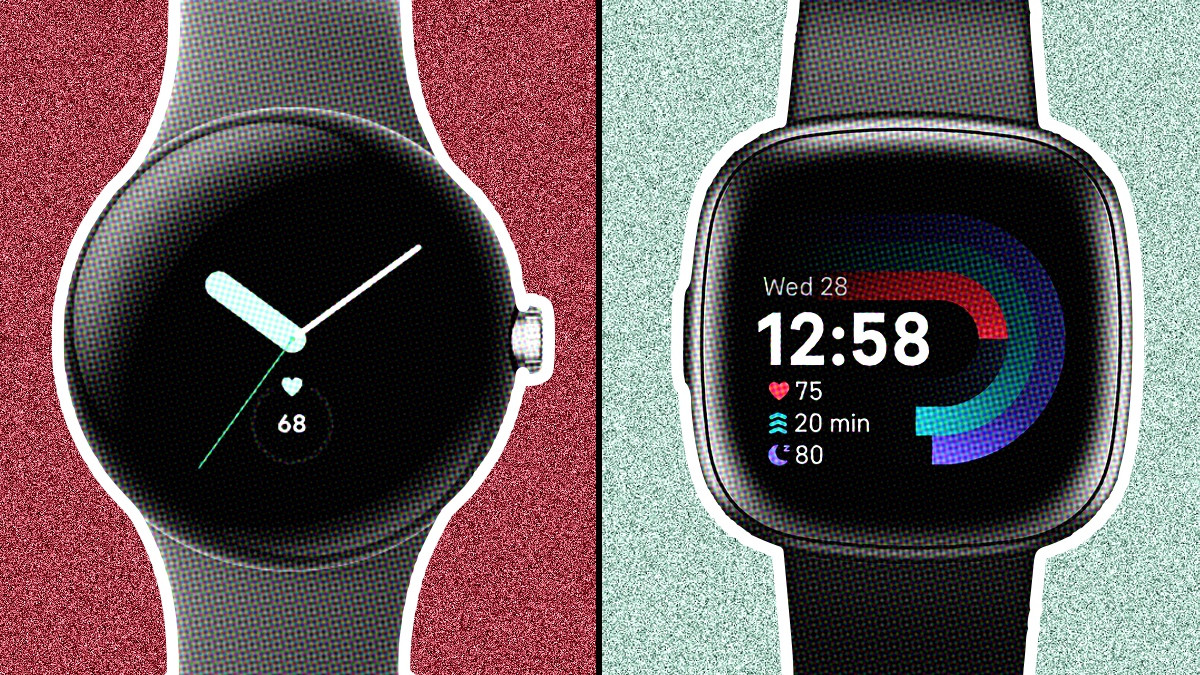
Here at Wareable, we rate both the Google Pixel Watch and Fitbit Versa 4 as solid smartwatches in the right hands.
If you're picking between them, though, there are plenty of differences (and some similarities) to know about before you decide.
It's why we've created this complete comparison guide, analyzing the key elements of each watch's design, feature set, tracking experience and battery life.
For a more in-depth look at each smartwatch, you can check out our extended reviews. Below, though, we'll be sizing this pair up against one another. Who wins? Let's find out.
Price comparison
Relatively speaking, these two smartwatches sit on opposite ends of the spectrum. Though technically under different brands, the fact Google now owns Fitbit means the prices for the smartwatch range - which also includes the Fitbit Sense 2 - are all laddered with each other in mind.
The Versa 4, then, assumes the entry-level role in the lineup, while the debut Google smartwatch is often found around double the price and is the flagship option of Wear OS.
Another factor to consider here is sale prices. Fitbit smartwatches are often more readily available at a discounted rate, while the Pixel Watch (released in October 2022) has yet to see any real price cut.
You can check the latest prices using the widgets below:
squirrel_12863289
squirrel_12862483
Design and feel
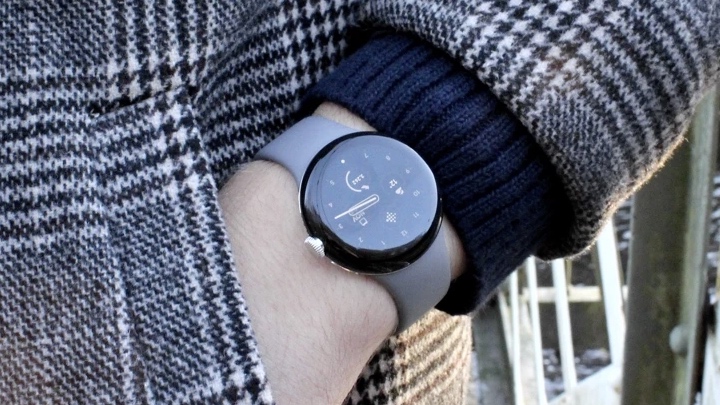
Given the price disparity, it shouldn't come as a surprise that there are plenty of design differences here.
There are the obvious distinctions in case shape and style - with the Pixel Watch's being a domed, circular face with a detailed crown on the right side, and the Versa 4 being a squared-off face with just a side button - but it's the feel on the wrist that we rate as the most noticeable factor here.
The Pixel Watch's stainless steel, heavier presence really adds to the build quality and feels much closer to something like the Apple Watch, while the Fitbit doesn't boast quite the same quality.
There are plenty of people out there that wouldn't really mind the Fitbit's more budget feel, we imagine, but it is something to keep in mind if you want something that can blend in with more formal outfits.
It's also important to note that both only come in one case size - 41mm for the Pixel Watch, and 40.5mm for the Versa 4 - though you can at least jazz things up with different bands. Each is available in four different finishes, too.
Then there are the other hardware differences. While both can monitor heart rate continuously, track location during exercise via the GPS, survive in water up to 5ATM, and make contactless payments because of the built-in NFC chip, the Pixel Watch's design unlocks a few more features than the Versa 4. We'll come onto those in the sections below.
Smart features and software
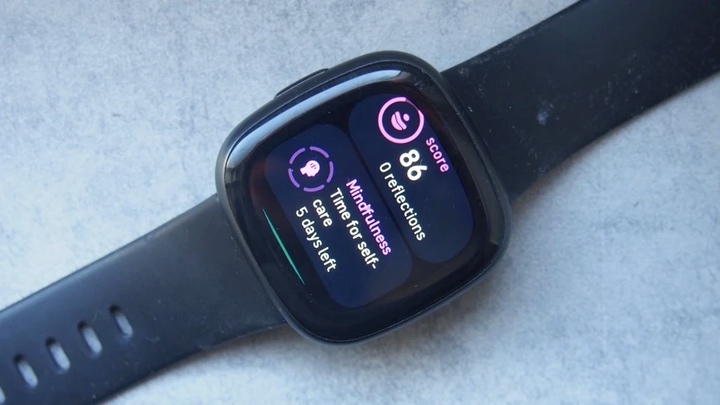
Arguably an even more significant difference between these two devices is the on-watch experience. While the Versa 4 runs on Fitbit OS, Google's smartwatch, as you would expect, is powered by Wear OS.
The latter is a much more powerful, capable and fast operating system, featuring a horde of third-party apps (like Spotify and Strava), integrations with Google's services and tons of customizable elements like Tiles and watch faces.
Fitbit's own operating system is similar to Wear OS in look and feel, but the overall implementation is much more basic. It's laggy when compared to Google's OS, and there's no functionality for things like apps (though you do get Google Maps and, coming soon, Google Wallet).
Then there's the Pixel Watch's LTE support. Provided you buy the LTE edition and pay the necessary subscription, you'll unlock the ability to remain connected even when away from your phone - and even have access to the likes of SOS calls.
No such support exists for the Versa 4, but that's not to say it's entirely devoid of smart features.
It boasts support for Amazon's Alexa smart assistant (kind of bizarrely), which means it can match up in that sense to the Pixel Watch's Google Assistant, and can still ping you notifications and calendar events when connected to your phone.
And, speaking of phones, compatibility is possibly its biggest advantage over the Pixel Watch. While Google's smartwatch is Android-only, Fitbit's smartwatches are able to work on both iOS and Android.
Health, sleep and fitness tracking
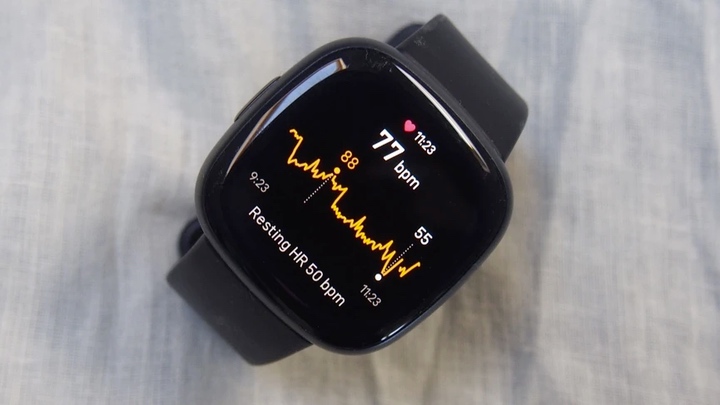
This is the one area in which things are slightly more aligned, given that the Pixel Watch's fitness and sleep tracking element is powered by Fitbit.
It means that the on-watch exercise metrics are presented in pretty much the same way, and that the Fitbit app is still your primary dashboard whichever you choose.
Despite the slightly different hardware, we've not really noticed any differences in the accuracy of the fitness or exercise tracking, either. Both are reliable enough - though, as you'll see if you continue on to our reviews, heart rate accuracy is a bit iffy from time to time.
To make up for that, both do at least feature Fitbit's best-in-class sleep tracking. While the Pixel Watch misses out on the more detailed elements, such as noise and snore detection, SmartWake alarms and mindfulness content, it does still offer an excellent core experience that includes insights into sleep stages and a sleep score.
It's only really when you begin to get into health tracking that the differences emerge.
Two big health features are split across the Versa 4 and Pixel Watch, with the former taking blood oxygen (SpO2) monitoring and the latter able to perform electrocardiogram (ECG) readings.
And despite the Pixel Watch's more advanced heart monitor, it doesn't offer notifications for irregular rhythms or high/low heart rates like the Versa 4 does.
It does at least have another exclusive in the form of Fall Detection, but, overall, it doesn't really extend itself from the Versa 4 in the tracking department.
Battery life
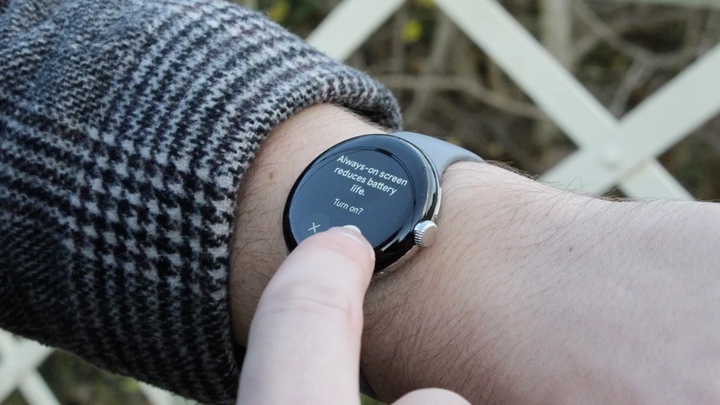
While the Pixel Watch dunks on the Versa 4 in most areas, as we've detailed above, it pays for it heavily in battery life.
After using the watch since its release, we grade it as its biggest issue to resolve when Google gets around to the Pixel Watch 2. It means that despite some great functionality and a superb design, you're going to have to charge it every day.
And given that it relies on you wearing it during sleep in order to provide insights such as Daily Readiness, it can get pretty tricky to pack that charge into your routine.
Things naturally improve if you turn off features like the always-on display, or if you don't use it for things like GPS-tracked exercise, but, even still, that 24-hour battery estimate is a bit of a stretch.
It's a surprise, as well, because Fitbit has traditionally excelled in battery life - and it's something we imagined would translate to the Pixel Watch.
In comparison, the Versa 4 is estimated to reach around six days, and we consistently find that rings true in testing. This isn't wholly unexpected, given its lack of smart features and operating system, but it's still impressive.
Verdict: Which is best?
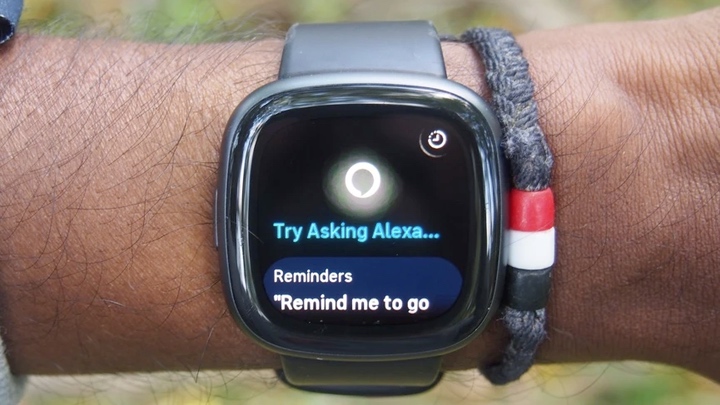
The Pixel Watch and Fitbit Versa 4 are two very different smartwatches, all things considered, and this makes it relatively easy to recommend the type of user that should be choosing them.
We think the Versa 4 is a great starter smartwatch for those who don't want to get too bogged down in things like apps and features, and are much more concerned with just having a capable tracker on their wrist. It's not the nicest-feeling or most feature-packed device, but what it is capable of is will be enough for a lot of users out there.
For those who do want to make a leap forward, the Pixel Watch is a good choice. You still get all the best bits of Fitbit's tracking ecosystem (save for a couple of odd health tracking omissions) while also enjoying a nicer design and a much smoother operating system and all the benefits that come with it.
The battery life is a serious issue, though, so we do also recommend that anybody considering the Pixel Watch also check out the wider collection of Wear OS smartwatches before choosing.
How we test
